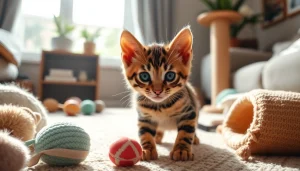
Understanding Bengal Breeders
If you’re considering adding a Bengal cat to your family, understanding the role of a Registered Bengal Breeder is essential. Bengal cats are known for their striking appearance and energetic personalities, but finding a reputable breeder is crucial for ensuring a healthy and well-socialized pet. The following sections will help you navigate the complexities of choosing the right Bengal breeder for your needs.
What Makes a Registered Bengal Breeder?
A registered Bengal breeder is an individual or business that is officially recognized within the feline breeding community, typically by an organization such as The International Cat Association (TICA) or the Cat Fanciers’ Association (CFA). These breeders adhere to specific guidelines and standards that promote responsible breeding practices and the overall welfare of the breed.
Key characteristics of a registered Bengal breeder include:
- Strict adherence to breed standards: Registered breeders maintain the physical and temperament standards set by the governing bodies.
- Health testing: They conduct necessary genetic and health tests on breeding cats to screen for common health issues.
- Ethical breeding practices: They prioritize the well-being of the cats, ensure proper socialization, and do not engage in unethical breeding methods.
- Transparency: A reputable breeder is open about their breeding practices, history, and the health of their cats.
The Importance of TICA Registration
Being a TICA-registered breeder signifies a commitment to ethical breeding and the health of the Bengal breed. This registration offers several advantages, including:
- Access to a network of other registered breeders, leading to better breeding practices.
- Entitlement to participate in cat shows and competitions that can validate the quality of the cats produced.
- Compliance with TICA’s stringent genetic testing and health screening requirements.
- Support from TICA in terms of guidance, resources, and education on best breeding practices.
Thus, when searching for a Bengal kitten, ensuring your breeder is TICA-registered should be one of your primary criteria.
Evaluating Breeder Credibility
Choosing the right breeder involves a thorough evaluation process. Here are some actionable steps to assess breeder credibility:
- Research online: Look for reviews, testimonials, and feedback on third-party platforms to gauge the breeder’s reputation.
- Visit the cattery: An in-person visit can reveal a lot about the breeder’s practices. Check the living conditions, health of the cats, and how the breeder interacts with their animals.
- Ask for lineage documentation: A credible breeder should provide you with detailed lineage records of their kittens.
- Discuss health management: Ask the breeder about health testing results and vaccination schedules for their cats to ensure transparency in health practices.
Taking these steps can help you feel more confident in your decision when selecting a Bengal breeder.
Choosing the Right Bengal Kitten
Once you’ve identified potential breeders, the next step is choosing the right kitten that suits your lifestyle and preferences. The following sections will detail how to identify quality traits, understand health implications, and evaluate temperament when selecting your new feline companion.
Identifying Quality Traits in Kittens
A quality Bengal kitten should have certain physical and behavioral characteristics. Here are a few traits to consider:
- Coat pattern and coloration: Bengal cats display stunning patterns and colors. Look for clear rosettes and vivid colors, which are indicative of a well-bred Bengal.
- Eyes: The eyes should be round and vivid, typically green or gold, which adds to their aesthetic appeal.
- Body structure: Healthy Bengals have a muscular build, showing strength and agility.
- Curiosity and playfulness: A quality kitten should be lively, playful, and curious about their surroundings.
Pay attention to these qualities as they are indicators of good breeding practices and a healthy kitten.
Health Concerns and Testing
Understanding health issues common in the Bengal breed is crucial when selecting a kitten. Some prevalent health concerns include:
- Hypertrophic Cardiomyopathy (HCM): This heart condition is common in Bengals, making it essential for breeders to screen their breeding cats for this genetic condition.
- Progressive Retinal Atrophy (PRA): A degenerative eye condition that can lead to blindness in affected cats. Screening can help prevent this issue in future generations.
- Other genetic issues: Responsible breeders should be constantly researching and testing for genetic disorders common in Bengals to ensure healthy lineages.
Request medical documentation showing the results of these tests to make an informed decision regarding your kitten’s health.
Understanding Bengal Temperament
Bengals are known for their distinct personality traits that include:
- Energetic nature: Bengals are very active and require ample playtime and engagement.
- Intelligence: They are highly intelligent cats, often enjoying puzzle toys and learning tricks.
- Sociability: Bengals are known to be affectionate and thrive on human interaction, often forming strong bonds with their families.
Considering these traits will help you gauge whether a Bengal kitten aligns with your lifestyle and expectations.
Questions to Ask Your Breeder
When meeting with your chosen breeder, it’s crucial to ask the right questions to ensure transparency and professionalism. Below are essential inquiries to guide your conversation:
Breeding Practices and Experience
Understanding a breeder’s experience and practices will give you insight into their commitment to the breed. Inquire about:
- Their tenure in breeding Bengal cats and their motivation.
- How many litters per year they produce to prevent overbreeding.
- The socialization practices they employ with kittens before sale.
These questions will help you learn about the care and priority placed on the wellbeing of the animals.
Parentage and Lineage Information
Knowing about the kitten’s ancestry can provide valuable insights into future behavior and health. Ask for:
- The pedigree of the kitten to understand its lineage.
- Any titles achieved by the parent cats in shows or competitions, indicating quality in breeding.
- Health histories of the parents to identify any inherited conditions.
A thorough understanding of lineage can help you anticipate any potential breed-related health issues.
Post-purchase Support and Resources
Established breeders often provide ongoing support even after the kitten is adopted. You should ask about:
- What kind of post-purchase support they offer—this can include advice on kitten care, health concerns, or behavioral issues.
- Their return policy in case something doesn’t work out, which reflects on their commitment to the kittens’ wellbeing.
- Any resources they may provide for first-time Bengal cat owners.
Having reliable post-purchase support can significantly ease your transition into Bengal cat ownership.
Common Misconceptions about Bengal Cats
As with any breed, several misconceptions can cloud potential owners’ perceptions of Bengal cats. Understanding the reality behind these misconceptions is essential for responsible ownership.
Myths vs. Facts About Bengal Temperament
Some common myths about Bengals include:
- They’re aggressive or wild: While Bengals are energetic and sometimes rambunctious, they are not inherently aggressive. With proper training and socialization, they can be affectionate and gentle companions.
- Bengals require significantly more care than other cats: While they do need mental and physical stimulation, they can thrive in a well-structured home environment with the same basic care as any other breed.
Being aware of these myths allows prospective owners to prepare adequately for Bengal ownership.
Maintenance and Care Considerations
Bengals, like other breeds, require specific care considerations:
- Grooming: Despite their short coat, Bengals do require occasional brushing to reduce shedding.
- Diet: A high-protein diet is essential for maintaining their energy levels and overall health.
- Exercise: Regular playtime and physical activity help prevent obesity and keep them mentally stimulated.
Understanding these care nuances sets you up for success in ensuring a healthy and happy Bengal.
The Legalities of Owning a Bengal Cat
Legislation concerning Bengal cats can vary by location, primarily based on their hybrid status from crossing domestic cats with Asian leopard cats. Review the local laws as some areas have restrictions or regulations in place. It is crucial to be well-informed to ensure you are compliant with any legal obligations regarding ownership.
The Journey of Getting Your Bengal
Bringing a new kitten home is an exciting journey that requires preparation and thoughtfulness. The following sections will guide you through the essential steps of welcoming a Bengal kitten into your home.
Preparing Your Home for a Bengal Kitten
Before bringing your kitten home, it’s vital to create a safe environment. Consider the following:
- Set up a designated space: A cozy area equipped with bedding, toys, and a litter box will help your kitten feel secure during their transition.
- Evaluate your home: Remove hazards such as small objects, toxic plants, and unsecured cords that could pose risks to a curious kitten.
- Purchase essential supplies: Ensure you have quality food, bowls, litter, a scratching post, and interactive toys ready for your kitten.
Making these preparations can ease the transition and help your kitten adjust quickly.
Bringing Your Kitten Home
When the day arrives to bring your kitten home, keep the following in mind:
- Safe transportation: Use a sturdy cat carrier to transport your kitten securely. Avoid loud noises and sudden movements during transit.
- Allow exploration: Once home, allow your kitten to explore their new space at their own pace while remaining close to supervise.
- Establish routines: Implement feeding, playtime, and litter box routines to help your kitten adjust and feel secure in their new environment.
Patience is key during this adjustment period as your new companion acclimatizes to their new surroundings.
First Steps After Adoption
After bringing your kitten home, there are essential first steps to establish a healthy relationship:
- Schedule a vet visit: Ensure your kitten receives proper vaccinations and health check-ups soon after adoption.
- Gradually introduce family members: Allow your kitten to familiarize themselves with their new family at a comfortable pace.
- Monitor behavior: Keep an eye on your kitten’s eating, litter box habits, and overall behavior for any signs of stress or health issues.
Building trust and understanding your kitten’s needs in the initial weeks is crucial for fostering a strong bond and ensuring a harmonious household.






